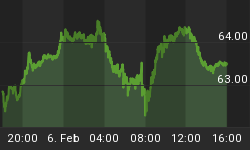It should be clear to all that Keynesian Counterfeiters now control many of the major governments across the globe. Fiscal and monetary "stimulus" led to the bond market collapses of southern Europe a couple of years ago. The Greek bond market was the first to crack at the beginning of 2010. Borrowing massive quantities of printed money caused yields on their 10-year note rose from 5.8% in January, to over 40% two years later. But the problem in Europe wasn't confined to just a Greek tragedy. In Portugal, their 10-year note yield soared from 4.07% at the start of 2010, to 15.4% in just 24 months. Similar, but less dramatic, bond duress occurred in Spain and Italy as well.
However, yields in all the above nations have since sharply contracted in the last few months. The credit for the reduced borrowing costs has been placed directly on the ECB and their Outright Monetary Transactions. As well as Mario Draghi's guarantee to do "whatever it takes" to placate Europe's debt market.
Yet the European economy has continued to deteriorate despite the efforts of their central bank. The unemployment rate in the Eurozone reached an all-time high last week of 11.8%, while the unemployment rate for those under 25 years old living is Spain reached a record 56.5%! But the worst is yet to come, as the blowback from the ECB's massive debt manipulation has yet to be fully realized. This is because the collapse of the European debt market was basically a conclusion made by their international creditors that they not only lost faith in the debt of those governments, but also in their currency. In other words, holders of European debt no longer believed they would be paid back their loans in real terms. A default through inflation was now the most likely outcome.
Therefore, it is impossible to permanently restore faith in Europe's debt and currency markets via their central bank; for a commitment to print an unlimited amount of money to purchase sovereign debt also serves to further erode faith in the currency that is underwriting the debt. Perhaps that is why Eurozone inflation is on its way to becoming a serious problem. Prices increased 2.2% YOY in December, up from a decline of .7% in July of 2009. But that is just a taste of what is to come in terms of inflation.
The growing threat of intractable inflation is not confined to Europe. China's growth rate in M2 was up 13.8% in December and inflation reached a 6-month high. Meanwhile, official inflation data in the U.S. appears quiescent. However, the truth is that the money supply as measured by MZM and M2 is soaring at an annualized growth rate of over 12%.
And now, Washington recently floated the idea of having the Treasury mint a trillion dollar platinum coin. Even though they stepped away from the idea for now, few truly understand how devastating this would be to the dollar and our bond market in the long term if D.C. chooses to go this route. The constitution currently forbids the Fed from directly participating in U.S. debt auctions. The central bank is confined to buying debt in the secondary market through the banking system. However, by creating a trillion dollar coin the Treasury could deposit it at the Fed and then draw on its own account at will. The U.S. government would in effect circumvent the banking system and then be able to directly monetize its own debt.
This would be a watershed event for the dollar and our bond market. Perhaps it would be more appropriate if the Treasury issued a trillion dollar banana; because our nation would lose any credibility that is left in our currency overnight. A letter sent to President Obama on Friday by six U.S. Senators urged the Whitehouse to bypass Congress and raise the debt ceiling. This would lead to a long and nasty fight in the judicial system. Therefore, the trillion dollar coin is one way to avoid having to usurp the authority over the debt ceiling from Congress. Either way, one thing is for sure and that is the supply of dollars is set to increase significantly. In fact, the supply of fiat currencies in general is guaranteed to surge at an even faster pace going forward. That is not good news for the value of paper money or the sovereign debt it supports.
In the not too distant future the U.S. will face a collapse in our bond and currency market similar to what is happening in Europe. Endless increases in our borrowing limits (no matter which method is eventually decided upon) and trillion dollar prints of dollars from the Fed (and now possibly even from the Treasury) will only hasten the demise of our economy. And the ultimate lesson yet to be learned on both sides of the Atlantic is that a bond and currency crisis cannot be solved through inflation.















